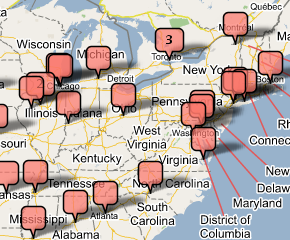on pigs and maps
I miss my maps.
Well, I miss google maps more specifically.
Even more specifically, I miss google maps on piggy-bank.
Piggy-bank is about making it easy to manage information you find interesting and share this with a group. Piggy Bank is an extension to the Firefox web browser that turns it into a “Semantic Web browserâ€, letting you make use of existing information on the Web in more useful and flexible ways. The information I find personally useful comes in many shapes / sizes (personal contacts, bookmarks, bibliographic citations, interesting news items, photos, events, personal email, etc.). While I’ve found lots of applications help me manage each of these independantly, the real benifit I’ve found is being able to see how individual bits of personal information connect. “Oh! I have a meeting with ‘Company Y’ at 5 pm today? Who have I talked with recently that is working with them?†The value from my perspective when you start acquiring enough data is in the relationships among the data rather than the data itself.
You might not know all of the relationships that exist between the information that you find personally interesting, but others may. Sharing these relationships with trusted colleagues creates webs of data greater than the sum of their individual parts.
Ok, back to maps.
One of the nice features of Piggy-Bank (and of the Simile project in general) is making it easy to not only to mix and match different bits of data, but to mix and match different services as well. One of the examples we provide is integrating Google maps to provide a geographical overlay of the data one might collect.

As a thought experiment, I did this with a group of folks that have a serious problem with low-cost, high-quality, flea-powered tube based amplifiers and high efficency speakers (ok, so its a relatively small group… but as a card-carrying member, this stuff sure makes my ears happy-happy!). And while I hope to eventually get around and connect the dots as to why I think global Initiatives like the Semantic Web and specific projects like Simile are so potentially revolutionary in helping communities share information, experiences and more effectively collaborate – the short version is I helped plot the folks that are in this group on a map. People didn’t realize how physically close there were to one another and this little bit of effort is helpful in starting to pull together regional events where folks can geek together on a face-to-face basis.
And it was easy! Piggy-bank helped reduce the cost for collecting this information, merge it with other bits and with minimal effort plot this on a map. Further it allows the ability to overlay *multiple* bits of data onto a map. You want to overlay hotels *and* subway stops in Boston? No problem! Ok.. so there is a problem (you need to have this data transformed into a common representation that faciliates this stitching together on information) . But the effort in doing this is far less than what it would have taken before. And if one person does manage to do the effort of translating the data regarding hotels from ’site X’ and another does subway stops from ’site Y’, its easy for the next person to reuse these translators (along with the translated data!). This in part is what the ‘Semantic Bank’ is all about. Being able to share this information in a way others can reuse it. Collectively, we’re all smarter than any one of us individually.
Ok… so here I am very excited. Whats next? For a long time I’ve been wanted to overlay airports and my travel history for the past 10 years as I’ve often though this would make for a cool map. Here I am getting global airport data into RDF (10 min worth of work) and then start the process of merging this in with my historical travel data.
I go to visualize this and Google turns around changes the API. This is to be expected – they’ve done this on a weekly basis for a while. Its beta, and I more than understand beta code. only now an additional requirement of using an application Key based on a static IP address has been introduced. Err…. now we’re stuck. This shoots the whole personal information meets google maps revolution. There is no static IP address for my client / browser. Various inquiries are underway with Google to see if if there are other options we might consider, but until then I’m unfortunatly mapless. ![]()
In the mean time, I sure do miss google maps on piggy-bank. If you want this too, please let us know over on the Simile list.
